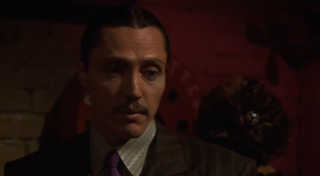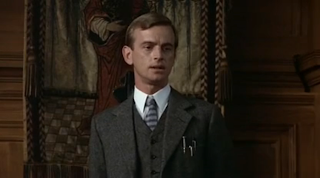Wilford Brimley shows up late in this film for about fifteen minutes basically to clear up all the plot for everyone and complete the film. After watching Absence of Malice for the first time I remembered very little of it other than Wilford Brimley's one scene in the film where the plot finally seems to move forward. Brimley's character appears to get to the bottom of the various problematic acts the other characters performed by deriving the information, and then punish those who have done wrong. The whole character could seem a bit of a contrivance just to get things over with, but it does not feel that way because of Wilford Brimley's performance.
Brimley is completely on for his fifteen minutes of the film and completely steals the scene from everyone including the two leads. Brimley got a most unique style when it comes to be imposing, and boy does it work well here. Brimley rather then yelling or even getting what would seem vicious in the traditional fashion but rather has this down home calm about himself. Brimely is in absolute command of the room so to speak as he does not only make it obvious that his character of Wells would and could get right down to the truth, but Brimley also makes it obvious that he will completely own the scene.
Brimley flawlessly creates the method in which Wells takes to get to the bottom of what exactly happened. Brimley is able to be right out confrontational in that so purely Wilford Brimley way where he intimidates while never raising his voice past a certain point. Brimley does even more than that though as Wells also acts as the moral center of the film, and Brimley is rather poignant in the unpretentious way he expresses his disappointment with the actions of others. Brimley switches method perfectly in the scene particularly when he chews out to of his associates. The first one who Wells respects more Brimley quietly but firmly dismisses, the second though Brimley leaves no hesitations as Wells bluntly and coldly fires him.
Brimley does not simply steal that one scene, but steals the entire film with it. Absence of Malice is a film that I felt for the most part just lied there proceedings without any real spark, other than that one scene where Paul Newman remembers he's Paul Newman, that is until Brimley shows up who breaths life into the story with his astute performance. The part of Wells is just there to clear up the plot, but Brimley does more than just fulfill his role. Brimley makes Wells into a character that lives past that one scene though through his honest portrayal of an intelligent man who wants to do the right thing and to make sure that he confronts everyone else what they have done wrong. Brimley never makes Wells overly prideful or egotistical, but rather a man who knows he is in the right and does not mind saying so.
Body Heat is essentially a remake of Double Indemnity with one of its few major additions being the minor character of Teddy Lewis. Double Indemnity contained a great supporting performance by Edward G. Robinson, but the equivalent character in this film is severely weakened partly because Robinson's role Keyes's is broken into two characters. The strongest supporting performance in the film instead belongs to Mickey Rourke as one of Ned Racine(William Hurt)'s former clients who has a criminal past, which comes useful to Racine when he himself wants to break the law by murdering the rich husband of the lusty woman he is having an affair with.
Rourke's only in the movie for about four minutes but is able to make the strongest impression out of the entire cast. Teddy is arsonist who makes an explosive device for Racine, but also tries to add a few words of wisdom at the same time. Rourke is superb in finding his character of Teddy as he very coolly puts everything to Racine. Rourke in just his few minutes gives the whole history of his character in his attitude which shows that Teddy knows quite a few ways around the park by now. Teddy knows that getting involved in any crime is a pretty stupid thing to do, but he basically recognizes that he really is not quite smart enough himself not to be criminal.
Mickey Rourke shows exactly what made him a thing in the 80's. Rourke just owns his scenes with William Hurt, and does brings a weight to the proposed murder the way that Edward G. Robinson did in the original film. Rourke's second scene is equally strong as Teddy tries to warn Ned of a double cross, as Rourke delivers an emotionally intense performance that gets to the really heart of the matter of the film and strangely makes Teddy, probably was not meant to be, but Rourke is able to make him the moral center of the film, and pretty much, in just his few minutes of screen time, subverts the role Ted Danson and J.A. Preston were suppose to fill in terms of the scheme of the film.
Rourke, just like Wilford Brimely, pretty much steals the film although Rourke does it in even less time with even less to work with. Rourke just like Brimely doesn't reside to fulfilling just the limited plot device that Teddy is, and instead makes Teddy a man who there is clearly more to than what we allowed to see. I wish the film had been reworked with Rourke in mind to give the character of Teddy a greater presence in the film, past just the two short scenes he has because Rourke builds so much potential with the part that technically speaking could have been just a simple character that made no lasting impression on the film whatsoever.
Christopher Walken did not receive an Oscar nomination for portraying Tom in Pennies From Heaven.
Pennies From Heaven is an entertaining and rather stunning musical about the downward spiral that comes from a sheet music salesman's affair with an innocent schoolteacher, although I completely understand why Fred Astaire hated it.
If you were to cast the part of an unsavory pimp who can dance would you really say anyone besides Christopher Walken? Christopher Walken is yet another one scene wonder who shows up one scene of Pennies of Heaven to be a well dressed but bluntly cruel man. If there is someone who can make a strong impression with one scene Christopher Walken definitely works. There is just something so oddly fascinating about his screen presence, and this only becomes all the more fascinating when he starts breaking out into a most extraordinary dance number where he tap dances and strips his way while bouncing across a bar.
There really is not much to the "real" part of the performance as there frankly is not much of the character of Tom, but Walken knows how to be both charismatic and callous in basically the same breath Even more importantly though I suppose is that he also know how to be Christopher Walken and that is all that is really required here. I could only see Christopher Walken go from encouraging someone to try new things enthusiastically to threatening to cut their face as smoothly as Walken does it here. Frankly the fact that the pimp starts dancing seems like the natural progression actually because he is played by Christopher Walken.
This performance is all about the dance number though of course, and Walken most definitely delivers in this respect. The whole concept of the dancing pimp is bizarre enough but it becomes gloriously so with Walken at the helm of it. Walken embraces it all in his wonderful number that is just fantastic. Walken delivers the dance but only adds to its greatness through his premium Christopher Walken expressions and noises throughout. I do wish that Tom was in more than one scene actually because I could have easily seen more of an off the wall Walken. All that needs to be said really is that no one could have done this part as well or as memorable as Walken and that is all there is to it.




































